Goats are known for their curious and sometimes adventurous eating habits. From nibbling on grass to chomping on leaves, goats are notorious for testing new foods.
But when it comes to fruits like mango, many goat owners wonder, can goats eat mango safely?
This article will cover everything you need to know, from the benefits of mango for goats to which parts are safe for them to consume.
Whether you’re looking to diversify your goat’s diet or just curious about its nutritional value, this comprehensive guide is here to help.
Key Points:
- Feed mango flesh to goats in moderation.
- Avoid mango seeds and leaves.
- Dried mango has a higher sugar content, so offer sparingly.
- Monitor for signs of overfeeding, such as bloating or diarrhea.
Can Goats Eat Mango?
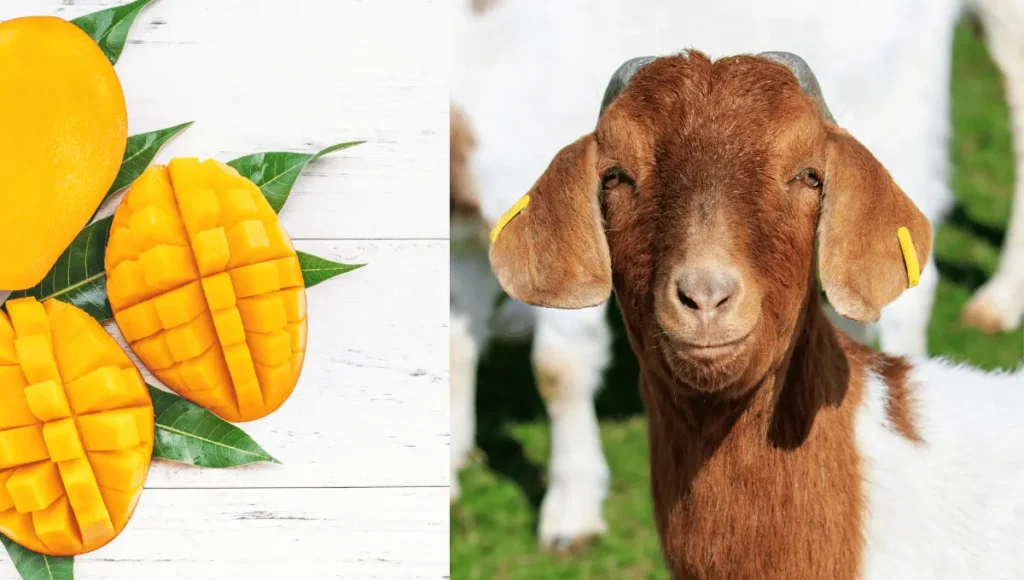
Mango is a sweet, tropical fruit packed with vitamins and minerals, but is it safe for goats? Yes, goats can eat mango in moderation.
Mangoes offer a variety of nutrients that can benefit goats, such as vitamins A, C, and E, as well as fiber, which can aid in digestion. However, just like any treat, it’s important to feed it in controlled amounts.
Mango should be offered as an occasional snack rather than a staple of their diet. While the flesh of the mango is safe and enjoyable for goats, some other parts of the fruit, like the seed or leaves, may not be as beneficial.
As with any new food, it’s crucial to introduce mangoes to your goats slowly to ensure they don’t have any negative reactions.
How to Feed Mango to Your Goats
Proper Preparation of Mango for Goats
Before feeding mangoes to your goats, it’s important to prepare the fruit properly. Wash the mango thoroughly to remove any pesticide residue or dirt that could be harmful.
After washing, peel the mango to expose the juicy flesh. Some goat owners leave the peel on, but it’s a good idea to start by offering the flesh first to see how your goats respond.
Cut the mango into small, manageable pieces that are easy for your goats to chew and digest. Remember to remove the seed as it poses a choking hazard and may not be safe for consumption.
Once prepared, you can offer mango to your goats in small amounts, mixing it with their regular feed if necessary.
Serving Sizes for Goats
It’s essential to monitor portion sizes when feeding mangoes to goats. A few small pieces a few times a week should suffice.
Overfeeding fruit, which contains natural sugars, can lead to digestive issues or an upset stomach.
As a general rule, treats like mango should make up no more than 10% of a goat’s overall diet. Keeping portions small ensures that your goats enjoy the health benefits without any negative side effects.
Benefits of Mango for Goats
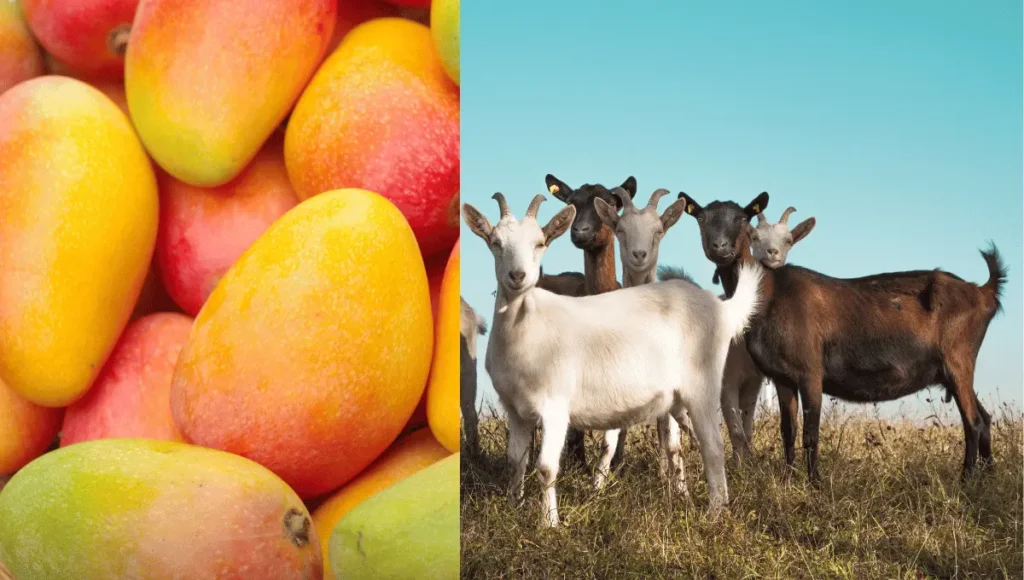
Rich Source of Vitamins
Mango is rich in essential vitamins like A, C, and E, which are important for goats’ overall health. Vitamin A supports healthy eyesight and skin, while vitamin C boosts the immune system.
Vitamin E is known for its antioxidant properties, which can help protect against cellular damage. These nutrients make mango a beneficial addition to your goat’s diet when given in moderation.
Fiber Content for Digestion
The fiber in mangoes can help with digestion in goats. Fiber is essential for maintaining a healthy digestive system, and a small amount of mango can provide a gentle boost to a goat’s fiber intake.
This can be particularly useful for goats that need a bit of help in regulating their digestion or preventing constipation.
Hydration and Energy Boost
Mangoes contain a significant amount of water, which can help keep goats hydrated, especially in hot weather.
The natural sugars in mango also provide a quick energy boost. This makes mango an ideal treat for active goats that could use a bit of extra energy.
Nutrition Value of Mango For Goats
| Nutrient | Amount | Benefit for Goats |
| Calories | 60 kcal | Provides energy, especially during activity. |
| Water Content | 83.5 g | Helps with hydration, especially in hot weather. |
| Carbohydrates | 15 g | Natural sugars for quick energy boosts. |
| Dietary Fiber | 1.6 g | Supports digestive health and prevents constipation. |
| Vitamin A | 54 µg (6% DV) | Promotes healthy eyesight and skin. |
| Vitamin C | 36.4 mg (40% DV) | Boosts immune system function. |
| Vitamin E | 0.9 mg (6% DV) | Acts as an antioxidant to protect cells. |
| Vitamin K | 4.2 µg (5% DV) | Assists with blood clotting and bone health. |
| Potassium | 168 mg | Helps maintain electrolyte balance and heart health. |
| Magnesium | 10 mg | Supports muscle and nerve function. |
| Calcium | 11 mg | Contributes to bone health. |
| Phosphorus | 14 mg | Aids in bone and teeth development. |
What Parts of Mango Do Goats Eat?
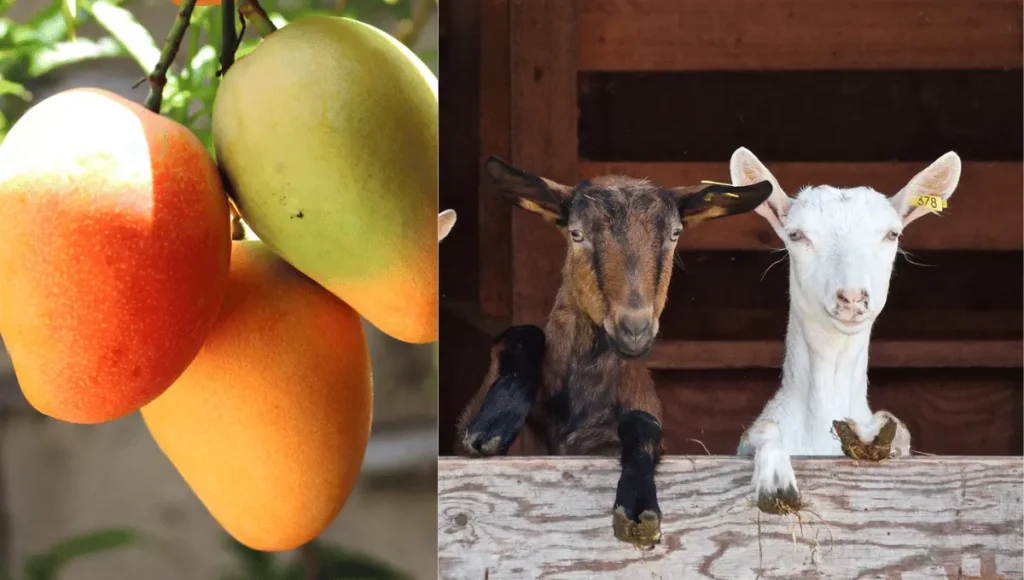
Can Goats Eat Mango Flesh?
Yes, the flesh of the mango is the safest and most nutritious part of the fruit for goats. It’s soft, sweet, and full of vitamins and minerals that can contribute positively to a goat’s diet.
Offering a few pieces of mango flesh as a treat can provide both nutritional benefits and enjoyment for your goats.
Can Goats Eat Mango Peels?
Goats can technically eat mango peels, but it’s best to feed them in moderation. While the peel is not toxic, it is tougher and can be harder for goats to chew and digest.
If your goats are used to eating fruits with skins, such as apples or bananas, you can try offering mango peels. Just be cautious and introduce them slowly to see how your goats handle them.
Can Goats Eat Mango Seeds?
No, goats should not eat mango seeds. The seed is large and hard, posing a significant choking hazard.
Additionally, it contains trace amounts of cyanide, which is toxic in large quantities. Always ensure that you remove the mango seed before offering the fruit to your goats.
Can Goats Eat Mango Leaves?
Mango leaves are generally not recommended for goats. While small amounts of mango leaves may not be immediately harmful, they contain tannins and other compounds that can cause digestive issues. It’s best to avoid feeding your goats mango leaves and stick to the flesh of the fruit instead.
Can Goats Eat Dried Mango?
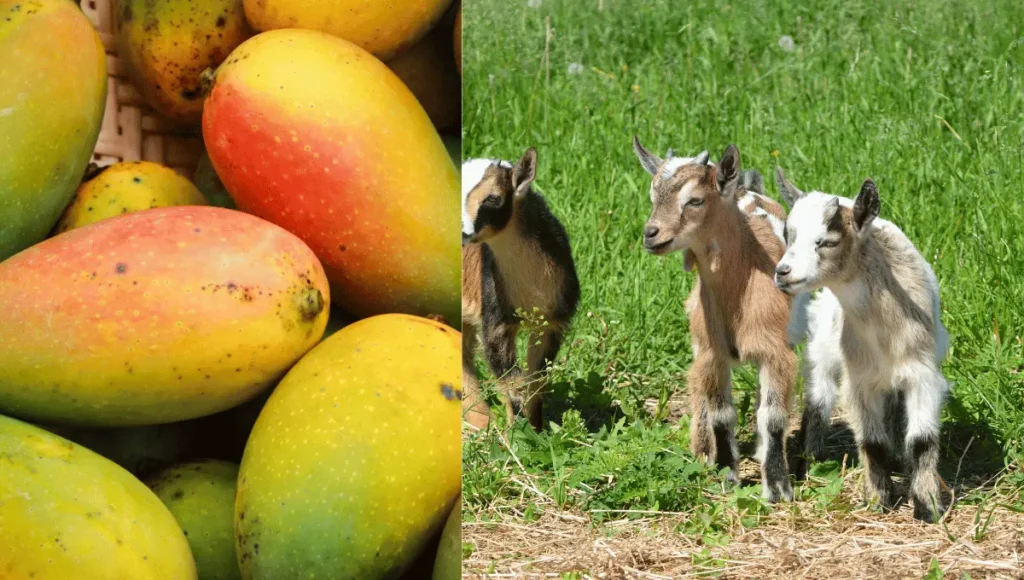
Dried mango is not toxic for goats, but it is less ideal compared to fresh mango. The drying process removes much of the fruit’s water content, leaving a more concentrated source of sugar.
Feeding dried mangoes to goats can increase the risk of overloading them with sugar, leading to potential digestive problems or weight gain.
If you decide to offer dried mango as an occasional treat, do so in very small portions. Keep in mind that the lack of moisture makes it harder for goats to chew, so always provide plenty of fresh water when giving dried mango.
What Happens if Goats Eat Too Much Mango?
Health Risks of Overfeeding Mango
Overfeeding mango to goats can lead to a range of health problems. The high sugar content in mango can upset a goat’s digestive system, causing bloating, diarrhea, or other gastrointestinal issues.
Additionally, excess fruit consumption can lead to an imbalance in a goat’s diet, reducing their intake of necessary fibers and nutrients from their regular feed.
Signs of Overconsumption
If your goats have eaten too much mango, you may notice some signs of discomfort, such as bloating, lethargy, or loose stools.
In severe cases, overconsumption can lead to colic, a condition that can be life-threatening if not treated promptly.
It’s important to monitor your goats closely after introducing mango or any new food into their diet.
Prevention and Moderation Tips
To prevent overfeeding, limit mango to a few small pieces as an occasional treat. Always balance their diet with plenty of fresh hay, grass, and a proper feed designed for goats.
By keeping mango and other fruits as a rare snack, you can ensure that your goats stay healthy and avoid the risks associated with overindulgence.
Conclusion
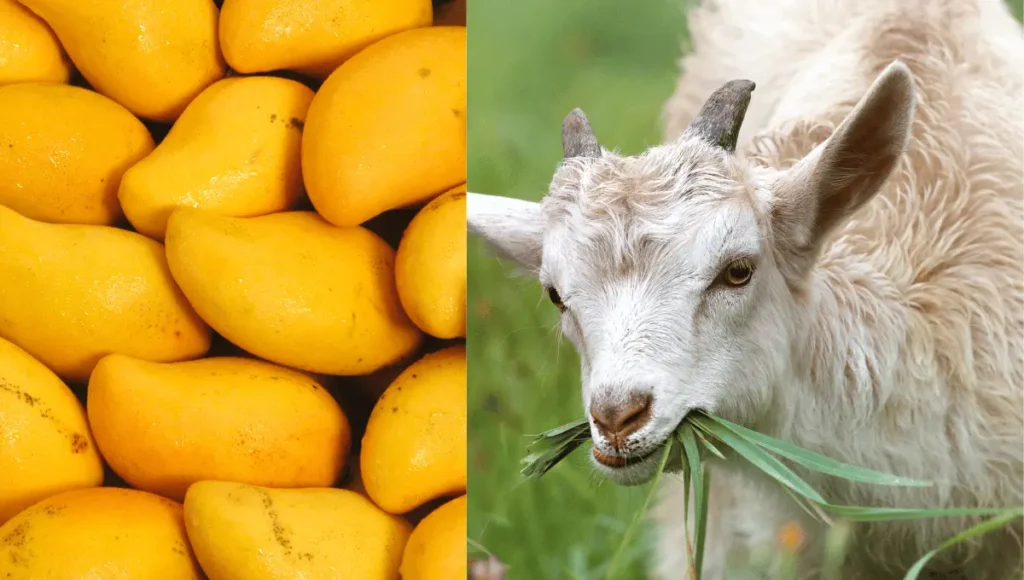
So, can goats eat mango? Yes, they can! Mango can be a healthy and tasty treat for goats when given in moderation. The fruit provides valuable nutrients such as vitamins, fiber, and hydration, but it’s essential to offer it in small amounts.
Always remove the seeds, limit sugary treats, and monitor your goats for any signs of overconsumption. By following these guidelines, you can safely add mango to your goat’s diet as an occasional snack.
FAQs
Can goats eat mangoes every day?
While goats can eat mango, it’s best to offer it as an occasional treat rather than a daily snack. Too much fruit, especially one high in sugar like mango, can upset a goat’s digestive system. A few pieces once or twice a week is ideal.
Is the mango peel safe for goats to eat?
Yes, mango peel is generally safe for goats, but it’s harder to digest than the flesh. It’s recommended to introduce the peel slowly to see how your goats handle it and to avoid overfeeding.
What should I do if my goat eats a mango seed?
Mango seeds are a choking hazard and contain trace amounts of cyanide. If your goat accidentally eats a mango seed, monitor them for signs of distress, such as choking or bloating, and consult a vet if necessary.
Can goats eat dried mangoes?
Yes, goats can eat dried mango, but it should be given sparingly due to its high sugar concentration. Dried mango lacks the water content of fresh mango and can lead to overconsumption of sugar, so offer only small amounts.
What are the health benefits of feeding mangoes to goats?
Mango is rich in vitamins A, C, and E, which support goats’ immune systems, skin health, and digestion. The fruit is also a good source of fiber and water, which aids in hydration and digestive health.

Pingback: Can Goats Eat Raisins? A Complete Feeding Guide - Farm Pets
Pingback: Can Goats Eat Cucumbers? A Complete Guide - Farm Pets
Pingback: Can Goats Eat Carrots? Safe Treats for Your Furry Friends